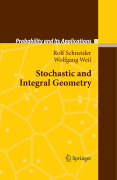
Stochastic geometry deals with models for random geometric structures. Its early beginnings are foundandnbsp;in playful geometric probability questions, and it has vigourously developed during recent decades, when an increasing number of real-world applications in various sciences required solid mathematical foundations. Integral geometry studies geometric mean values with respect to invariant measures and is, therefore, the appropriate tool for the investigationof random geometric structures that exhibit invariance under translations or motions. Stochastic and Integral Geometry provides the mathematically orientedreader with a rigorous and detailed introduction to the basic stationary models used in stochastic geometry – random sets, point processes, random mosaics – and to the integral geometry that is needed for their investigation. The interplay between both disciplines is demonstrated by various fundamental results. First book since Santalo's classic 1976 to combine stochastic geometry and integral geometry. It presents rigorous foundations of the models of stochasticgeometry as well as of the tools from integral geometry, and supplies with clear, complete, and comprehensible proofs of the major results. INDICE: 1.Prologue.- Part I: Foundations of Stochastic Geometry.- 2.RandomClosed Sets.- 3.Point Processes.- 4.Geometric Models.- Part II: Integral Geometry.- 5.Averaging with Invariant Measures.- 6.Extended Concepts of Integral Geometry.- 7.Integral-geometric Transformations.- Part III: Selected Topics from Stochastic Geometry.- 8.Some Geometric Probability Problems.- 9.Mean Values for Random Sets.- 10.Random Mosaics.- 11.Non-stationary Models.- Part IV: Appendix.- 12.Facts from General Topology.- 13.Invariant Measures.- 14.Facts from Convex Geometry.- References.- Index.
- ISBN: 978-3-540-78858-4
- Editorial: Springer
- Encuadernacion: Cartoné
- Páginas: 700
- Fecha Publicación: 01/09/2008
- Nº Volúmenes: 1
- Idioma: Inglés
